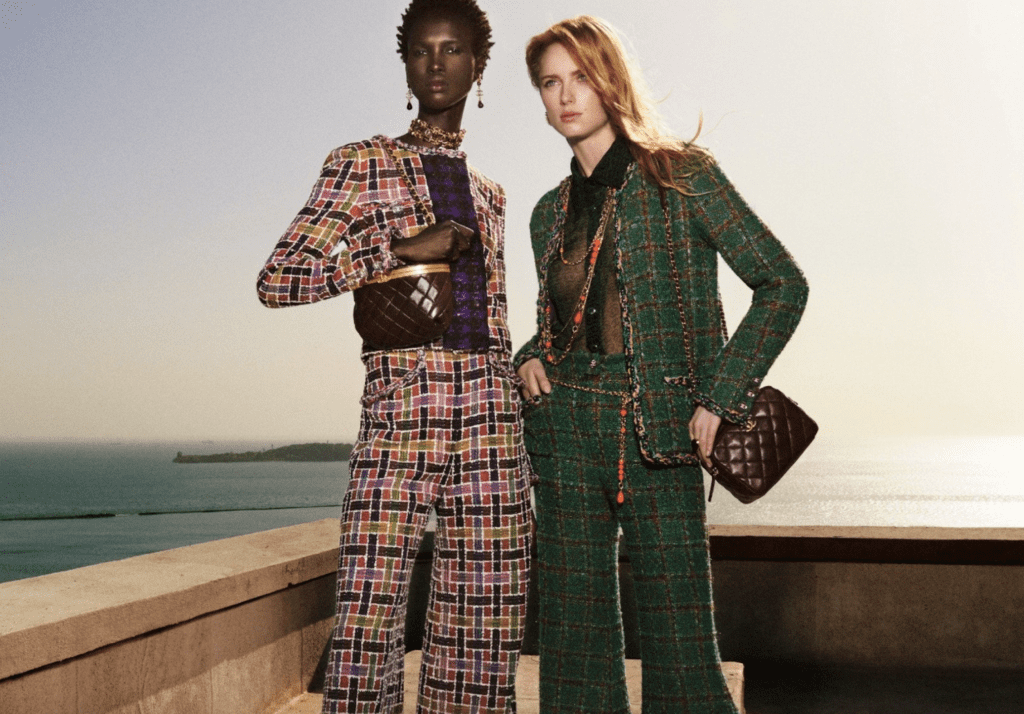Chanel is pushing for an order from a New York federal court that will block resale company What Comes Around Goes Around from continuing to confuse consumers by way of its use of Chanel trademarks, advertising Chanel products that have not been authorized for sale by Chanel and offering up Chanel goods that have been materially altered. On the heels of a multi-week jury trial early this year and a February 6 verdict in which the jury unanimously found that What Comes Around Goes Around (“WGACA”) had engaged in willful trademark infringement, false association, unfair competition, and false advertising, Chanel has lodged a motion for a permanent injunction.
Some Background: On the heels of the parties’ trial, a New York federal jury sided with Chanel, finding that WGACA is liable for: (1) willful trademark infringement, false association and unfair competition based upon its unauthorized use of Chanel’s trademarks and other indicia of Chanel; (2) willful trademark infringement based upon its creation and use of various hashtags containing “Chanel” or “Coco Chanel” to advertise and market products on social media; (3) willful trademark infringement based upon its sale and offering for sale of non-genuine CHANEL-branded products, including: (a) 13 handbags bearing voided stolen Chanel serial numbers from Renato Corti, (b) one handbag bearing Chanel Serial Number 10218184, (c) 51 handbags bearing voided Chanel Serial Numbers, (d) 779 CHANEL-branded point of sale items, and (e) materially altered or repaired CHANEL-branded products; (4) willful trademark infringement based upon its sale of counterfeit CHANEL-branded products; (5) and willfully engaging in false advertising.
Chanel’s Push for Injunctive Relief
Against that background given that the jury was limited to making decisions on “damages and legal remedies” (and not equitable ones), which saw it award Chanel $4 million in statutory damages “for its claim for trademark infringement based on WGACA’s sale or offering for sale of Chanel-branded handbags bearing counterfeit trademarks,” Chanel is now requesting that the court enter a permanent injunction in its favor against the reseller-defendant, as first reported by TFL.
> In terms of the aspects of Chanel’s proposed injunction, the luxury brand asks the court to bar WGACA from continuing to partake in infringing activities, such as “unfairly competing” with Chanel by taking any action that is likely to cause confusion or mistake among consumers; making unauthorized use of Chanel marks “other than to identify the items being offered for sale”; advertising, offering for sale, or selling any CHANEL-branded items that have not been authorized for sale by Chanel; and making any representations regarding the genuineness of any CHANEL-branded items or its ability to make such claims without proper documentation, among other things.
> Additionally, Chanel is also requesting that the court order WGACA to take specific action, such as: (1) recalling all infringing Chanel items that it has sold to consumers or wholesalers since the start of the case back in March 2018; and (2) prominently displaying a disclaimer of affiliation and authorization on its website and on physical products, and prominently post a photograph of the CHANEL-branded item’s Chanel serial number on the WGACA webpage listing the item for sale.
Chanel v. WGACA: The Issue of Authenticity
One of the notable – although, not terribly surprising – points included in Chanel’s proposed injunction is its push to get the court to order WGACA to permanently refrain from “making advertising claims, certifying, guaranteeing or making any representations regarding the genuineness of any CHANEL-branded items or its ability to make such claims without proper documentation.” In other words, Chanel wants WGACA to refrain from alerting consumers that the Chanel products it advertises/sells are authentic unless it has proof that they are, in fact, authentic.
This point is worthy of attention both from a practical standpoint and a competition-centric one. (And it is unsurprising in light of the fact that Chanel has taken issue with the ability of resellers to authenticate its products in the past; in its ongoing case against The RealReal, for example, Chanel has argued that none of TRR’s staff is “properly qualified or trained in authentication of Chanel products to support [its] claims as to the genuineness of the products it resells” and “only products purchased directly from Chanel and its authorized retailers can be certain to be” – and therefore, be advertised as – “genuine and authentic.”)
> Practically speaking, the critical part of the equation here, according to Chanel (and trademark law tenets), is that in order for a trademark-bearing product to be considered authentic, that product has to have been initially authorized for sale by the trademark holder; in this case, that is Chanel. The practical problem, as WGACA argued during and in the wake of the parties’ trial, stems from the fact that third parties, including resellers, do not have access to things like Chanel’s proprietary authentication database, which includes serial numbers of products that have been authorized for sale. And that lack of access makes it difficult for them to say with certainty whether a Chanel product is authentic even if it appears to be above board in all other respects.
If the court opts to include this authentication-centric point in its injunction, it will not only limit a key competitive element of the resale model: the ability of companies to tout the products they are offering up as the “real” thing; it may limit strictly WGACA and other resellers’ capacity to sell Chanel products to those for which they can produce Chanel-issued authentication documentation. Given that at least some portion of products circulating in the secondary market have changed hands more than once already and have been sold without such documentation, this may pose a sizable obstacle for those operating in the resale market.
> From a competition/antitrust point of view, as we have previously argued, there may be a potential issue at play in the event that notoriously-controlling luxury brands: (1) exclusively get to dictate when a product is – or maybe more importantly, is not – genuine, and (2) take a notably hardline stance to prevent resellers from making claims about product authenticity, while simultaneously refusing to engage with them to help ensure that products are, in fact, authentic. (We dove into this in the past, as this has come up in other cases, as well.)
Ultimately, the inclusion of this point in the permanent injunction could be a particularly striking one in the event that it serves to hamper the ability of resellers to offer up pre-owned Chanel-branded goods altogether (i.e., it could impose strict limits on who can actually sell Chanel – even in a secondary market capacity), and to give rise to issues from a competition point of view in the process.
The case is Chanel, Inc. v. What Goes Around Comes Around, LLC, et al., 1:18-cv-02253 (SDNY).











